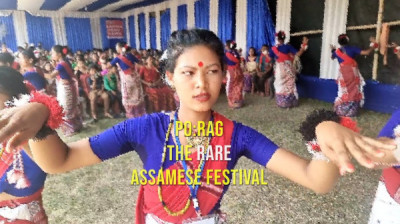History & Traditions
The Porag celebration usually lasts for three days and takes place after the winter or summer harvest. It begins with prayers and rituals conducted by the village elders and Mibus (traditional priests). These spiritual leaders perform chants and the sacred Mibu Dagnam dance, invoking blessings for good health, wealth, and communal harmony. Offerings are made to the spirits of ancestors and to Donyi-Polo, the revered sun-and-moon deities of Mising belief.
Feasting is the heart of the festival. Villagers come together to prepare and share traditional delicacies like pork dishes and po:ro apong, the locally brewed rice beer found in almost every Mising household. The rhythmic beats of drums, folk songs, and the aroma of freshly cooked food create a festive atmosphere that brings the entire community together.
A unique aspect of Porag is the invitation extended to married women who have settled in other villages. They are warmly welcomed back to their maternal homes, symbolizing reunion, affection, and social harmony. Neighboring villages also take part, emphasizing the Mising people’s deep sense of friendship and community.
Evenings during Porag are filled with traditional dances and songs, performed mostly by the youth. The dances portray agricultural life, daily activities, and social unity. The festival concludes with a grand closing dance, where guests and villagers join hands, marking the end of celebration with joy and gratitude.
Beyond its religious and agricultural significance, the Porag Festival reflects the Mising tribe’s enduring connection to nature and heritage. It preserves their age-old traditions while spreading a universal message of peace, prosperity, and togetherness.
FAQs with Short Answers
-
What is the Porag Festival?It’s a post-harvest festival of the Mising tribe in Assam, celebrating prosperity and gratitude.
-
How often is Porag celebrated?Usually once every two to three years after the harvest.
-
How long does Porag last?The celebration continues for three days.
-
Who leads the rituals?Village priests called Mibus perform prayers and dances.
-
What foods are enjoyed during Porag?Pork dishes and po:ro apong (rice beer) are traditional highlights.
-
Why are married women invited back?To strengthen family ties and celebrate reunion.
-
What is Mibu Dagnam?A sacred priestly dance performed during Porag rituals.
-
What types of dance are performed?Traditional Mising folk dances depicting rural life and unity.
-
Why is Porag important to the Mising tribe?It reinforces cultural identity, social harmony, and connection to nature.
-
Where is Porag mainly celebrated?In Mising villages across Assam, especially along the Brahmaputra Valley.
